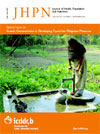
|
The Journal of Health, Population and Nutrition
icddr,b
ISSN: 1606-0997
EISSN: 1606-0997
Vol. 22, No. 3, 2004, pp. 293-303
|
 Bioline Code: hn04037
Bioline Code: hn04037
Full paper language: English
Document type: Research Article
Document available free of charge
|
|
|
The Journal of Health, Population and Nutrition, Vol. 22, No. 3, 2004, pp. 293-303
| en |
Sociobehavioural Research Methods for the Introduction of Vaccines in the Diseases of the Most Impoverished Programme
Kaljee, Linda M.; Pack, Rob; Pach, Al; Nyamete, Andrew & Stanton, Bonita F.
Abstract
Participation in vaccination campaigns worldwide, particularly the Expanded Programme on
Immunization, has increased significantly in recent years. However, there remain multiple and integrated
behavioural, sociocultural and political-economic barriers to vaccination. The Diseases of the
Most Impoverished (DOMI) Programme has undertaken shigellosis disease-burden studies and oral
cholera and typhoid Vi polysaccharide vaccine trials in seven Asian countries. As part of these projects,
sociobehavioural studies have been undertaken to determine the potential demand for vaccines
for these diseases and the obstacles and enabling factors that may affect acceptance, delivery, and use
of vaccines. A theoretical model of acceptance of vaccination and a triangulation of qualitative and
quantitative methods have been used for fully elucidating the range of issues relating to vaccination
for shigellosis, cholera, and typhoid fever. In this paper, the theoretical and methodological basis of the
DOMI projects has been reviewed in a context of current sociobehavioural research on the acceptability
and desirability of vaccination.
Keywords
Vaccination; Research design; Dysentery; Bacillary; Cholera; Typhoid fever; Asia
|
| |
© Copyright 2004 - The Journal of Health, Population and Nutrition
Alternative site location: http://www.jhpn.net
|
|
